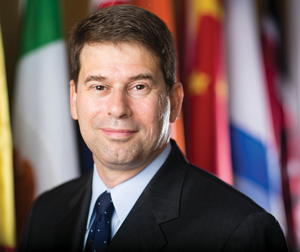2021 Leaders in Graduate Education in International Affairs
THIS GUIDE IS NO LONGER ACTIVE. For the current FP Guide, click here.
Tufts University, The Fletcher School
Understanding History and a Multidisciplinary Approach Are Key to Navigating the 21st Century

Daniel Drezner, Professor of International Politics, The Fletcher School, Tufts University
Barely a fifth of the way through the 21st century, we have experienced a host of catastrophes, among them a global financial crisis, Hurricane Katrina, the effects of climate change, and a devastating pandemic.
That’s the context for “The End of the World and What Comes After,” a course that professor of international politics Daniel Drezner will teach next spring at The Fletcher School at Tufts University. Given the multiple challenges facing global stability, Drezner recommends two approaches to properly train future leaders in international affairs for the next 50 years.
 First, students must learn the proper perspective from history, to understand how catastrophes can cause systemic collapse and how societies can rebuild. The recent part of history is not the only relevant part, Drezner says. For example, the deadliest pandemic in recorded history was the Black Death of the 14th century, estimated to have killed as many as 200 million people in Europe, Asia, and North Africa. However, in the 15th and 16th centuries, Europe flourished under the Renaissance.
First, students must learn the proper perspective from history, to understand how catastrophes can cause systemic collapse and how societies can rebuild. The recent part of history is not the only relevant part, Drezner says. For example, the deadliest pandemic in recorded history was the Black Death of the 14th century, estimated to have killed as many as 200 million people in Europe, Asia, and North Africa. However, in the 15th and 16th centuries, Europe flourished under the Renaissance.
You can do pretty well by doing good. It is gratifying to know that you are trying to make the world a better place, and you can often see the impact you are having, in my case on students, or on the issue that you care about.Second, students should be adaptable, by taking an interdisciplinary approach to issues, Drezner says. He quotes philosopher Isaiah Berlin, who differentiated between foxes, who know a little about many things, and hedgehogs, who know one big thing.
“In dealing with crises, you want a lot of foxes. You need people with the intellectual capacity, creativity, and flexibility to deal with the next crisis,” Drezner says.
Fletcher is adapting to today’s challenges, hiring historians and scholars in areas that are of concern both today and also when considering the future, such as climate policy and cybersecurity.
Drezner himself has a multidisciplinary background. In addition to teaching, he has held positions with the nonprofit Civic Education Project, the RAND Corporation, and the US Department of the Treasury. He is a regular contributor to The Washington Post. However, teaching and research are his true loves.
Teaching “is like whitewater river rafting. When you see [students] realize where the bend in the river is about to come, it’s incredibly gratifying.”
New Fast-Tracked
Master in Global Affairs
Starting in the fall of 2021, Fletcher will offer a new Master in Global Affairs that can be completed in 16 months, rather than the usual two academic years. This intensive degree program targets students who are ready to take a deep dive, become experts in their area of specialization, and immediately pursue a career path in that area. The specializations range widely, including international negotiation and conflict resolution, sustainable development, and technology policy. The new degree includes a practicum and a possible summer internship for credit, and can be taken either full-time or part-time, to allow students to simultaneously work and study.
Tufts University, The Fletcher School
https://fletcher.tufts.edu
[email protected]
+1 617-627-3040
Contents
- 2021 Leaders in Graduate Education in International Affairs
- Tufts University, The Fletcher School
- Northwestern University
- Nova Southeastern University, Master’s Program in National Security Affairs and International Relations
- Johns Hopkins University School of Advanced International Studies
- Columbia University, School of International and Public Affairs
- George Mason University, Schar School of Policy and Government
- University of Kent, Brussels School of International Studies
- Arizona State University, Thunderbird School of Global Management
